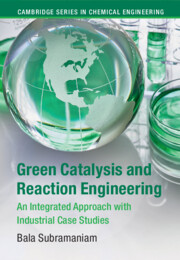Book contents
- Green Catalysis and Reaction Engineering
- Cambridge Series in Chemical Engineering
- Green Catalysis and Reaction Engineering
- Copyright page
- Dedication
- Contents
- Preface
- Acknowledgments
- 1 Sustainability Challenges of the Chemical Industry
- 2 Multiphase Catalytic Processes and Sustainability Challenges
- 3 Ethylene Production from Diverse Feedstocks and Energy Sources
- 4 Ethylene Epoxidation in Gas-Expanded Liquids with Negligible CO2 Formation as a Byproduct
- 5 Spray Reactor-Based Terephthalic Acid Production as a Greener Alternative to the Mid-Century Process
- 6 Sustainability Assessments of Hydrogen Peroxide-Based and Tertiary Butyl Hydroperoxide-Based Propylene Oxide Technologies
- 7 Separation of Propane/Propylene Mixture by Selective Propylene Hydroformylation in Gas-Expanded Liquids
- 8 A Greener Higher Olefin Hydroformylation Process
- 9 Solid Acid-Catalyzed Olefin/Isoparaffin Alkylation in Supercritical Carbon Dioxide
- 10 Epilogue
- Index
- References
2 - Multiphase Catalytic Processes and Sustainability Challenges
Published online by Cambridge University Press: 15 September 2022
- Green Catalysis and Reaction Engineering
- Cambridge Series in Chemical Engineering
- Green Catalysis and Reaction Engineering
- Copyright page
- Dedication
- Contents
- Preface
- Acknowledgments
- 1 Sustainability Challenges of the Chemical Industry
- 2 Multiphase Catalytic Processes and Sustainability Challenges
- 3 Ethylene Production from Diverse Feedstocks and Energy Sources
- 4 Ethylene Epoxidation in Gas-Expanded Liquids with Negligible CO2 Formation as a Byproduct
- 5 Spray Reactor-Based Terephthalic Acid Production as a Greener Alternative to the Mid-Century Process
- 6 Sustainability Assessments of Hydrogen Peroxide-Based and Tertiary Butyl Hydroperoxide-Based Propylene Oxide Technologies
- 7 Separation of Propane/Propylene Mixture by Selective Propylene Hydroformylation in Gas-Expanded Liquids
- 8 A Greener Higher Olefin Hydroformylation Process
- 9 Solid Acid-Catalyzed Olefin/Isoparaffin Alkylation in Supercritical Carbon Dioxide
- 10 Epilogue
- Index
- References
Summary
Solvents play a vital role in chemical processes such as solubilizing reactants, facilitating product/catalyst separation, increasing reaction rates, enhancing solubilities of gaseous reactants (such as O2, CO, H2) and providing heat capacity to manage the heat of reaction. However, solvent use can also cause adverse environmental impacts by increasing the carbon footprint and/or emitting harmful vapors. This chapter highlights such roles of solvents in multiphase catalytic processes such as hydroformylation, carbonylation, hydrogenation and oxidation through industrial examples. It also discusses how the pressure-tunable properties of supercritical fluids (SCFs) and gas-expanded liquids (GXLs) can be harnessed to develop greener chemical technologies through efficient feedstock utilization, process intensification, enhanced process safety and reduced use of volatile organic solvents. Emerging feedstocks, such as plant-based biomass, shale gas and sequestered CO2 offer excellent opportunities for using such tunable solvents.
- Type
- Chapter
- Information
- Green Catalysis and Reaction EngineeringAn Integrated Approach with Industrial Case Studies, pp. 13 - 49Publisher: Cambridge University PressPrint publication year: 2022

